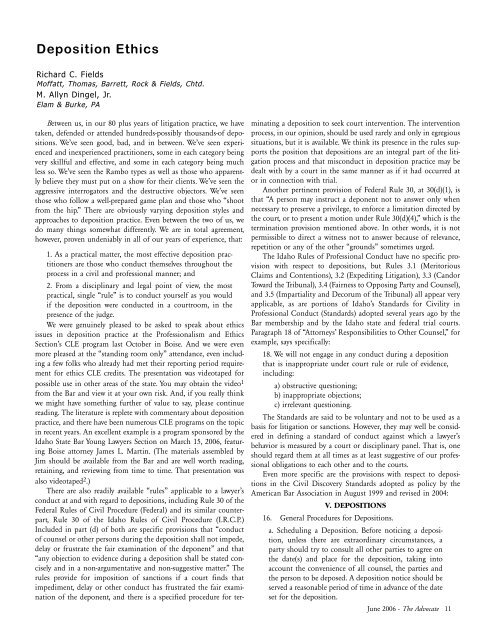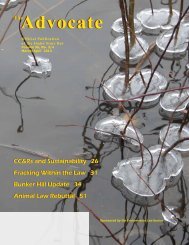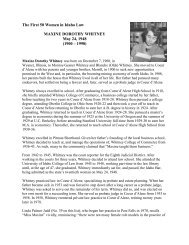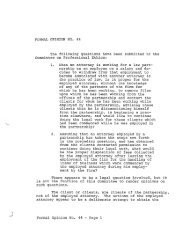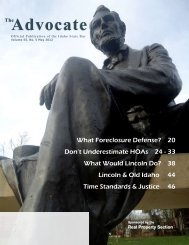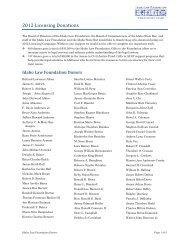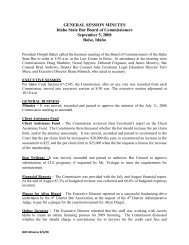The Advocate - June 2006 - Idaho State Bar - Idaho.gov
The Advocate - June 2006 - Idaho State Bar - Idaho.gov
The Advocate - June 2006 - Idaho State Bar - Idaho.gov
Create successful ePaper yourself
Turn your PDF publications into a flip-book with our unique Google optimized e-Paper software.
Deposition Ethics<br />
Richard C. Fields<br />
Moffatt, Thomas, <strong>Bar</strong>rett, Rock & Fields, Chtd.<br />
M. Allyn Dingel, Jr.<br />
Elam & Burke, PA<br />
Between us, in our 80 plus years of litigation practice, we have<br />
taken, defended or attended hundreds-possibly thousands-of depositions.<br />
We’ve seen good, bad, and in between. We’ve seen experienced<br />
and inexperienced practitioners, some in each category being<br />
very skillful and effective, and some in each category being much<br />
less so. We’ve seen the Rambo types as well as those who apparently<br />
believe they must put on a show for their clients. We’ve seen the<br />
aggressive interrogators and the destructive objectors. We’ve seen<br />
those who follow a well-prepared game plan and those who “shoot<br />
from the hip.” <strong>The</strong>re are obviously varying deposition styles and<br />
approaches to deposition practice. Even between the two of us, we<br />
do many things somewhat differently. We are in total agreement,<br />
however, proven undeniably in all of our years of experience, that:<br />
1. As a practical matter, the most effective deposition practitioners<br />
are those who conduct themselves throughout the<br />
process in a civil and professional manner; and<br />
2. From a disciplinary and legal point of view, the most<br />
practical, single “rule” is to conduct yourself as you would<br />
if the deposition were conducted in a courtroom, in the<br />
presence of the judge.<br />
We were genuinely pleased to be asked to speak about ethics<br />
issues in deposition practice at the Professionalism and Ethics<br />
Section’s CLE program last October in Boise. And we were even<br />
more pleased at the “standing room only” attendance, even including<br />
a few folks who already had met their reporting period requirement<br />
for ethics CLE credits. <strong>The</strong> presentation was videotaped for<br />
possible use in other areas of the state. You may obtain the video1 from the <strong>Bar</strong> and view it at your own risk. And, if you really think<br />
we might have something further of value to say, please continue<br />
reading. <strong>The</strong> literature is replete with commentary about deposition<br />
practice, and there have been numerous CLE programs on the topic<br />
in recent years. An excellent example is a program sponsored by the<br />
<strong>Idaho</strong> <strong>State</strong> <strong>Bar</strong> Young Lawyers Section on March 15, <strong>2006</strong>, featuring<br />
Boise attorney James L. Martin. (<strong>The</strong> materials assembled by<br />
Jim should be available from the <strong>Bar</strong> and are well worth reading,<br />
retaining, and reviewing from time to time. That presentation was<br />
also videotaped2 .)<br />
<strong>The</strong>re are also readily available “rules” applicable to a lawyer’s<br />
conduct at and with regard to depositions, including Rule 30 of the<br />
Federal Rules of Civil Procedure (Federal) and its similar counterpart,<br />
Rule 30 of the <strong>Idaho</strong> Rules of Civil Procedure (I.R.C.P.)<br />
Included in part (d) of both are specific provisions that “conduct<br />
of counsel or other persons during the deposition shall not impede,<br />
delay or frustrate the fair examination of the deponent” and that<br />
“any objection to evidence during a deposition shall be stated concisely<br />
and in a non-argumentative and non-suggestive matter.” <strong>The</strong><br />
rules provide for imposition of sanctions if a court finds that<br />
impediment, delay or other conduct has frustrated the fair examination<br />
of the deponent, and there is a specified procedure for ter-<br />
minating a deposition to seek court intervention. <strong>The</strong> intervention<br />
process, in our opinion, should be used rarely and only in egregious<br />
situations, but it is available. We think its presence in the rules supports<br />
the position that depositions are an integral part of the litigation<br />
process and that misconduct in deposition practice may be<br />
dealt with by a court in the same manner as if it had occurred at<br />
or in connection with trial.<br />
Another pertinent provision of Federal Rule 30, at 30(d)(1), is<br />
that “A person may instruct a deponent not to answer only when<br />
necessary to preserve a privilege, to enforce a limitation directed by<br />
the court, or to present a motion under Rule 30(d)(4),” which is the<br />
termination provision mentioned above. In other words, it is not<br />
permissible to direct a witness not to answer because of relevance,<br />
repetition or any of the other “grounds” sometimes urged.<br />
<strong>The</strong> <strong>Idaho</strong> Rules of Professional Conduct have no specific provision<br />
with respect to depositions, but Rules 3.1 (Meritorious<br />
Claims and Contentions), 3.2 (Expediting Litigation), 3.3 (Candor<br />
Toward the Tribunal), 3.4 (Fairness to Opposing Party and Counsel),<br />
and 3.5 (Impartiality and Decorum of the Tribunal) all appear very<br />
applicable, as are portions of <strong>Idaho</strong>’s Standards for Civility in<br />
Professional Conduct (Standards) adopted several years ago by the<br />
<strong>Bar</strong> membership and by the <strong>Idaho</strong> state and federal trial courts.<br />
Paragraph 18 of “Attorneys’ Responsibilities to Other Counsel,” for<br />
example, says specifically:<br />
18. We will not engage in any conduct during a deposition<br />
that is inappropriate under court rule or rule of evidence,<br />
including:<br />
a) obstructive questioning;<br />
b) inappropriate objections;<br />
c) irrelevant questioning.<br />
<strong>The</strong> Standards are said to be voluntary and not to be used as a<br />
basis for litigation or sanctions. However, they may well be considered<br />
in defining a standard of conduct against which a lawyer’s<br />
behavior is measured by a court or disciplinary panel. That is, one<br />
should regard them at all times as at least suggestive of our professional<br />
obligations to each other and to the courts.<br />
Even more specific are the provisions with respect to depositions<br />
in the Civil Discovery Standards adopted as policy by the<br />
American <strong>Bar</strong> Association in August 1999 and revised in 2004:<br />
V. DEPOSITIONS<br />
16. General Procedures for Depositions.<br />
a. Scheduling a Deposition. Before noticing a deposition,<br />
unless there are extraordinary circumstances, a<br />
party should try to consult all other parties to agree on<br />
the date(s) and place for the deposition, taking into<br />
account the convenience of all counsel, the parties and<br />
the person to be deposed. A deposition notice should be<br />
served a reasonable period of time in advance of the date<br />
set for the deposition.<br />
<strong>June</strong> <strong>2006</strong> - <strong>The</strong> <strong>Advocate</strong> 11


